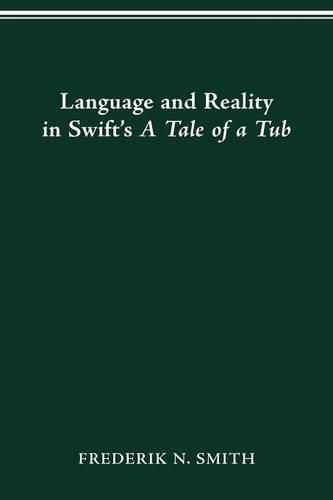Readings Newsletter
Become a Readings Member to make your shopping experience even easier.
Sign in or sign up for free!
You’re not far away from qualifying for FREE standard shipping within Australia
You’ve qualified for FREE standard shipping within Australia
The cart is loading…






This title is printed to order. This book may have been self-published. If so, we cannot guarantee the quality of the content. In the main most books will have gone through the editing process however some may not. We therefore suggest that you be aware of this before ordering this book. If in doubt check either the author or publisher’s details as we are unable to accept any returns unless they are faulty. Please contact us if you have any questions.
The noted scholar Irvin Ehrenpreis refers to the brilliant style which makes A Tale of a Tub the greatest prose satire in English. Professor Smith affirms that judgment as one with which few would quarrel, but charges that most critics, like the ones whom Swift himself parodies, have too often been content to merely catalogue Swift’s stylistic devices or to cite them as examples of the Modern Author’s faults. What has never been fully recognized is that the young Swift, after his early imitative and conventional odes, was experimenting with a new tone and a new genre, and was using a style to work his way toward an understanding of the relationship between language and reality. This was a crucial issue in the seventeenth century, and it provided Swift with one of his most persistent themes and established the basis of his unique style, which, instead of character or plot, bears the burden of his satiric message. Professor Smith takes style to be neither the same as a writer’s ideas nor the vehicle for their conveyance, but rather his habitual means of arranging concepts, experiences, and implications into a coherent and significant form. The linguist Benjamin Lee Whorf posits a connection between language and reality so intimate that the systemizations in a particular language dictate the reality of the person who speaks that language, forcing on him certain perceptions, denying him others, and effectively channeling his reason. Dr. Smith infers a comparable link between an individual’s private habits of language and his private perception of reality, and argues that the uniqueness of a writer’s style represents his personal organization of the world-his personal arrangement, not merely of words, but of reality itself. Frederick N. Smith is associate professor and head of the Department of English at the University of Akron.
$9.00 standard shipping within Australia
FREE standard shipping within Australia for orders over $100.00
Express & International shipping calculated at checkout
This title is printed to order. This book may have been self-published. If so, we cannot guarantee the quality of the content. In the main most books will have gone through the editing process however some may not. We therefore suggest that you be aware of this before ordering this book. If in doubt check either the author or publisher’s details as we are unable to accept any returns unless they are faulty. Please contact us if you have any questions.
The noted scholar Irvin Ehrenpreis refers to the brilliant style which makes A Tale of a Tub the greatest prose satire in English. Professor Smith affirms that judgment as one with which few would quarrel, but charges that most critics, like the ones whom Swift himself parodies, have too often been content to merely catalogue Swift’s stylistic devices or to cite them as examples of the Modern Author’s faults. What has never been fully recognized is that the young Swift, after his early imitative and conventional odes, was experimenting with a new tone and a new genre, and was using a style to work his way toward an understanding of the relationship between language and reality. This was a crucial issue in the seventeenth century, and it provided Swift with one of his most persistent themes and established the basis of his unique style, which, instead of character or plot, bears the burden of his satiric message. Professor Smith takes style to be neither the same as a writer’s ideas nor the vehicle for their conveyance, but rather his habitual means of arranging concepts, experiences, and implications into a coherent and significant form. The linguist Benjamin Lee Whorf posits a connection between language and reality so intimate that the systemizations in a particular language dictate the reality of the person who speaks that language, forcing on him certain perceptions, denying him others, and effectively channeling his reason. Dr. Smith infers a comparable link between an individual’s private habits of language and his private perception of reality, and argues that the uniqueness of a writer’s style represents his personal organization of the world-his personal arrangement, not merely of words, but of reality itself. Frederick N. Smith is associate professor and head of the Department of English at the University of Akron.